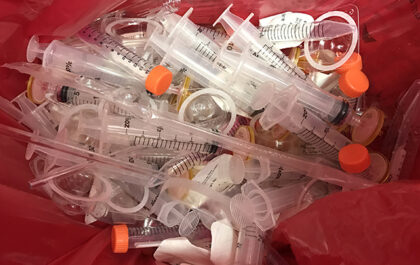Couples unable to conceive naturally can turn to in-vitro fertilization (IVF) to have a family. An IVF failure can leave you feeling frustrated and devastated. A specialist can assess you to determine the root cause of the failed fertility treatment.
Table of Contents
What Can Cause a Failed Fertility Treatment
Fertility treatment can fail due to the following reasons:
Quality and Quantity of Eggs
With age, the quality of eggs can deteriorate, contributing to failed in-vitro fertilization. Age tends to affect the number of eggs that can be retrieved for the treatment. An expert might need to conduct fertility tests to determine a suitable treatment.
Embryo Implantation Failure
Failure of embryos to implant in the uterus can contribute to failed fertility treatment. If the embryos are of poor quality, the implantation may fail. Genetic abnormalities in embryos can lead to implantation failure.
Unhealthy Lifestyle
During your IVF treatment, you can change your lifestyle habits to help increase your chances of success. You might need to stop drinking and smoking for a couple of months. If you continue with these lifestyle habits, you may experience an IVF failure.
Eating too many processed foods and not getting enough sleep can affect egg quality. Eat nutritious meals and get sufficient sleep to help attain IVF success.
Endometriosis
Endometriosis is one of the reasons for failed fertility treatment. The endometriosis tissue can grow in your uterine wall and shed during menstruation. This growth tends to block the path of eggs and contribute to a failed IVF. The presence of BLC6 protein can indicate that you have endometriosis.
Ovarian Response
During your IVF treatment, you may need an injection containing follicle-stimulating hormone (FSH) to help boost egg production. This process can fail in some women, and the ovaries might not respond properly to the medication. A poor ovarian response can decrease the chances of IVF success.
Chromosomal Abnormalities
IVF might fail if the embryos have chromosomal abnormalities. Such abnormalities tend to arise when the embryo has missing, irregular, or extra portions of DNA. Your body can reject this type of embryo and lead to a failed IVF.
Underlying Health Conditions
Underlying health conditions, such as diabetes, thyroid problems, and cancer can impact fertility treatment. Such health issues can make it difficult for an embryo to implant in the uterus. Treating these health conditions first can reduce failed in-vitro fertilization.
Steps To Take After an IVF Failure
Once the in-vitro fertilization procedure fails, you can take time to recover mentally and physically. Then you can book an appointment with your fertility specialist to figure out the cause of the failed IVF. The specialist may recommend a BCL6 test to check whether you have endometriosis.
If you have endometriosis, a doctor can prescribe medication to help manage tissue growth blocking egg passage. Surgery might be another option. Hormone therapy may also help correct certain health issues. After healing, you can go through another IVF cycle.
If your doctor rules out endometriosis, they might suggest a change of lifestyle habits, such as:
- Quitting drinking
- Stopping tobacco use
- Sleeping adequately
- Eating a balanced diet
If you’ve had a couple of failed IVF procedures, comprehensive tests can help determine the cause. Once you get the results, a doctor can recommend suitable treatment depending on your case.
When To Try IVF Again
The standard space between IVF cycles can be a full menstrual cycle or a couple of months. During this period, you can heal from inflammation caused by ovarian stimulation. A failed fertility treatment can also drain you emotionally. This break can help you get some rest and relief as well as give you time to decide what you want to do.
You may need to pause the treatment to make financial arrangements for the next cycle.
Get Tested To Prevent Failed IVF
Your fertility specialists can suggest a series of tests to reduce the risk of IVF failure in the future. If the issue stems from endometriosis, you can get personalized treatment. Negative test results can indicate that other underlying health issues require immediate treatment. Get tested to determine what’s causing failed IVF. Your fertility specialist can help you determine what the best course of action is after a failed IVF procedure.
Related posts
When was the first presidential election in the US?
The election process in the world’s most powerful nation, the US, has come a long way. Various amendments have been made to the Constitution that allowed black men, white women and other disadvantaged groups to participate in the elections. Further amendments during the 60s and…
Tips & Trick For Healthy Glowing Skin
Lorem ipsum dolor sit amet, consectetur adipiscing elit. Nam laoreet, nunc et accumsan cursus, neque eros sodales lectus, in fermentum libero dui eu lacus. Nam lobortis facilisis sapien non aliquet. Aenean ligula urna, vehicula placerat sodales vel, tempor et orci. Donec molestie metus a sagittis…
My Fight With Depression. Concussions
Lorem ipsum dolor sit amet, consectetur adipiscing elit. Nam laoreet, nunc et accumsan cursus, neque eros sodales lectus, in fermentum libero dui eu lacus. Nam lobortis facilisis sapien non aliquet. Aenean ligula urna, vehicula placerat sodales vel, tempor et orci. Donec molestie metus a sagittis…
Top 10 most visited tourist places in the world
Lorem ipsum dolor sit amet, consectetur adipiscing elit. Nam laoreet, nunc et accumsan cursus, neque eros sodales lectus, in fermentum libero dui eu lacus. Nam lobortis facilisis sapien non aliquet. Aenean ligula urna, vehicula placerat sodales vel, tempor et orci. Donec molestie metus a sagittis…
How Digital Health Technology Is Beneficial?
Digital health revolves around the usage of diverse technological platforms including mobile health, teen health, configurable remote patient monitoring, etc to improve the connection between the patients and the doctors. Across the healthcare system, the horizon and scope of digital health have helped create opportunities…
How Latest Farmtrac Tractors are Improving Farming in India?
India mostly relies on farming, and a large part of the population depends on it for their livelihoods. Recently, there’s been a big shift towards using modern farming techniques and machinery to make farming more productive and efficient. A good example of this is the…
Dispelling Myths: Demystifying Rx Waste and Expiration Dates – WasteX Pharmaceutical Waste Disposal Separates Fact from Fiction
The specter of “expired” medication looms large, conjuring images of potent chemicals wreaking havoc on water sources and ecosystems. But before you panic toss that bottle of pills, let’s delve into the truth about pharmaceutical waste and expiration dates, separating fact from fiction. At WasteX…
Sustainable Living in Memphis: Green Initiatives and Eco-Friendly Hotspots
Memphis, a city known for its rich cultural heritage and vibrant atmosphere, is increasingly becoming a hub for sustainable living. As environmental awareness continues to grow, residents and businesses in Memphis are embracing green initiatives and fostering eco-friendly practices. Let’s explore the city’s commitment to…
Today's pick
Hot topics
Stay connected
Meet the Author

Gillion is a multi-concept WordPress theme that lets you create blog, magazine, news, review websites. With clean and functional design and lots of useful features theme will deliver amazing user experience to your clients and readers.
Learn moreCategories
- Animals (7)
- Apps & Softwares (8)
- Automotive (8)
- Beauty (8)
- Business (141)
- Cars (12)
- Cartoon (3)
- Cook (4)
- Cooking (1)
- Design (8)
- Economy (6)
- EDUCATION (25)
- Entertainment (16)
- Fashion (23)
- Fitness (2)
- Food (16)
- Gaming (51)
- Guide (20)
- Health (119)
- Home (52)
- Home improvement (12)
- Interior (3)
- Law (16)
- Life (1)
- LifeStyle (99)
- Marketing (5)
- Motivation (9)
- Movie (6)
- Movies (1)
- Music (3)
- News (8)
- Painting Art (1)
- People (15)
- Photography (7)
- Review (113)
- Services (7)
- Social Media (6)
- Sport (9)
- Sports (12)
- Style (10)
- Swimming (1)
- Tech (125)
- Travel (26)
- Uncategorized (17)
- Vape (5)
- Western (3)
- World (2)










